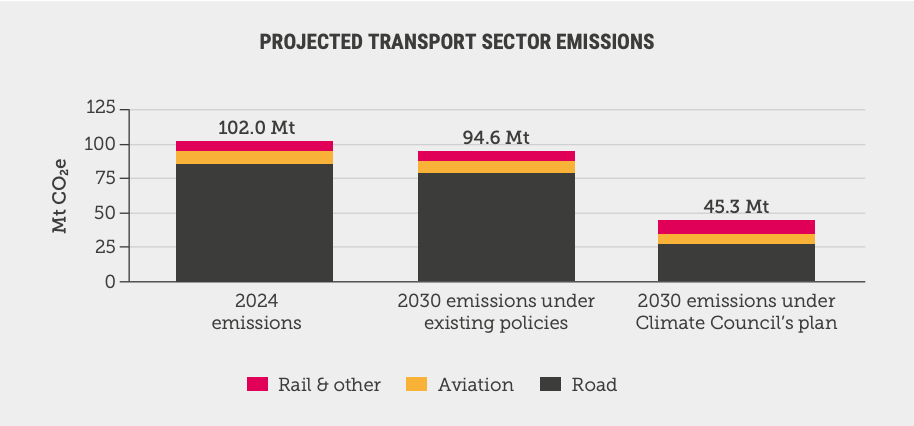FOR IMMEDIATE RELEASE
TUESDAY 9 APRIL 2024
Better travel options can halve climate pollution from transport by 2030
HALVING TRANSPORT POLLUTION in Australia by 2030 is possible under the Climate Council’s groundbreaking plan to electrify the nation and cut climate pollution by 75% this decade.
Following the introduction of legislation for a New Vehicle Efficiency Standard, Climate Council’s recent Seize the Decade report shows Australia can slash transport pollution further and faster by encouraging the uptake of shared and active transport - like walking, riding, electrified public transport and rideshare.
Transport is Australia’s fastest-growing source of climate pollution, contributing more than 22 percent of our national total. We can clean up transport and seize the decade by:
- Boosting shared and active travel, to shift around 5% of passenger kilometres travelled each year out to 2030 - by improving their reliability, availability and accessibility of these cleaner options;
- Electrifying our shared fleets, so one-third of all passenger kilometres are travelled by electric vehicles by 2030, by prioritising vehicles that are on the road the most like taxis, rideshare and fleet vehicles; and
- Transforming our freight system, to shift one-third of road freight to rail by 2030 and electrify heavy road vehicles, by addressing gaps in infrastructure and incentivising the uptake of clean technologies.
By shifting to shared, active and electrified transport, we can halve climate pollution in our transport sector, from 102 Mt CO2e in 2024 to 45.3 Mt CO2e in 2030 under the Climate Council’s plan.
Climate Council Head of Policy and Advocacy, Dr Jennifer Rayner, said: “Alongside getting effective fuel efficiency standards in place, we need to support and enable a wide range of cleaner, healthier ways of moving around.
“Australians who live in our cities should have the choice to leave the car at home because they have access to great shared and active transport options.
“Walking, riding, using electrified public transport and other shared options more often can see us make huge and rapid cuts to climate and air pollution this decade. It’s also great for cutting congestion and travel costs, while making our streets safer and more enjoyable to spend time on.”
Climate Councillor and public health physician, Dr Kate Charlesworth, said: “Nobody likes getting stuck in traffic, and we don’t like breathing in the thick smell of petrol in the air either. The health impacts of poor air quality from vehicle pollution have substantial consequences for Australians’ health.
”Particulate pollution from cars is associated with respiratory and cardiovascular diseases, and linked to more than 11,000 premature deaths in Australia every year. By slashing climate pollution and cleaning up the way we move, we will also make it easier for Aussies to live healthier, safer lives.
“Governments can seize the opportunity to slash climate pollution from transport further and faster this decade than electric vehicles alone can. For the sake of our kids, our health, and our climate, it’s time to give Australians in our cities more choice of clean and healthy ways to get around.”
Read our plan to cut climate pollution from transport here.
ENDS
For interviews please contact Zerene Catacutan on 0438 972 260, [email protected]; or Lydia Hollister-Jones on 0448 043 015, [email protected]
About us:
The Climate Council is Australia’s leading community-funded climate change communications organisation. It was founded through community donations in 2013, immediately after the then-Abbott Government dismantled the Climate Commission. We provide authoritative, expert and evidence-based advice on climate change to journalists, policymakers, and the wider Australian community. For further information, go to: climatecouncil.org.au Or follow us on social media: facebook.com/climatecouncil and twitter.com/climatecouncil


